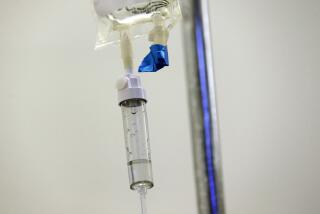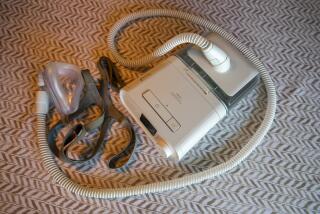Breast Implant Industry Outlook Is Hazy
- Share via
Questions about the safety of silicone breast implants have dampened demand for plastic surgery in the multimillion-dollar Southern California market, but physicians and manufacturers insist that the devices are safe.
The outlook for the industry remained clouded Thursday after an advisory panel to the Food and Drug Administration announced inconclusive recommendations. The panel unanimously recommended that implants be allowed to remain on the market, pending further studies, since available data did not prove significant dangers.
Earlier, the same panel said four makers of the implants had not presented sufficient information to prove the product safe.
The earlier news sent stocks of implant makers plummeting; the news that the products would remain available came after the close of the market. Mentor, a Santa Barbara manufacturer of implants and other medical devices, saw its stock drop $2.875 to $10.875, while competitor Bioplasty dropped $1.50 to $5.
Meanwhile, Los Angeles plastic surgeons worried about the impact of FDA recommendations on their practices.
Dr. Dennis Thompson, president of the Los Angeles Society of Plastic Surgeons, said patients have become more cautious about breast implants after press reports of possible health hazards.
He said the number of breast augmentations he does has dropped about 30% the past year, in part because of the slow economy and in part because of negative press reports on the operation.
Thompson said he believes that the implants are safe, and he’s concerned that if they become unavailable in the United States, patients will travel to Mexico, Europe or the Caribbean to get surgery.
Dr. Genevieve MacDonald, a West Hills plastic surgeon, said patients are asking more questions but still want the procedure. “Breast cancer patients are very upset that someone may be coming along and making a decision they wish to have for themselves,” she said.
Breast reconstruction after mastectomies makes up about 20% of the implant market, with cosmetic augmentation constituting the rest.
Breast implants have never been approved by the FDA. They have been used for about 30 years, but the FDA was not given the power to regulate them until 1976 and did not ask for scientific studies proving their safety until 1988.
About 600 plastic surgeons and 400 general surgeons in California work with silicone implants for breast reconstruction or augmentation, Thompson said.
The operation usually costs from $2,500 to $5,000, he said.
About 150,000 women a year in the United States have the implants surgically inserted; a total of about 2 million women are now using them.
Thompson had no figures on how many women have implants in the Los Angeles area, where about 200 plastic surgeons practice, but the region is known for its high rates of cosmetic surgery.
Complaints about breast implants have focused on the hardening of tissue around the implant, causing discomfort and malformations; charges that leaking silicone can cause autoimmune disease, and charges that deteriorating polyurethane coatings can cause cancer.
Thompson said that while some patients experience hardening tissue, “there is not a shred of scientific evidence that implants cause cancer or immune problems.”
But Sharon Snider, a spokeswoman for the FDA, said “that remains an open question. . . . We need epidemiological studies looking at the risk of cancer and autoimmune disease.”
In September, Bristol-Myers Squibb announced that it was quitting the breast-implant business after its marketing application for Surgitek implants was rejected by the FDA, which cited insufficient information with which to evaluate the product.
Other major producers of implants include Dow Corning, Mentor, Bioplasty and McGhan Medical Corp.
Mentor sold about $11 million in silicone gel implants in the United States last year, or about 15% of its total sales, which also include urology and ophthalmological products. Chief Financial Officer Gary Mistlin said that sales have been “up and down” this year, but that it’s unclear whether the fluctuation resulted from reports that the implants caused health problems.
“Our company’s philosophy is that the product is perfectly safe,” Mistlin said. Mentor also makes implants filled with saline solution instead of silicone gel, which are not now under FDA scrutiny. The share of saline implants has risen from 30% of the company’s sales two years ago to 50% today.
In January, the FDA will make a final decision on the panel’s recommendation. If it follows the panel’s lead, the implants would probably stay on the market while tests are completed over a period of several years.
* RELATED STORY: A1
More to Read
Inside the business of entertainment
The Wide Shot brings you news, analysis and insights on everything from streaming wars to production — and what it all means for the future.
You may occasionally receive promotional content from the Los Angeles Times.










